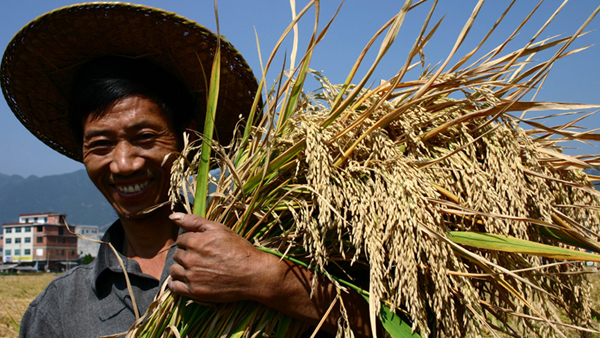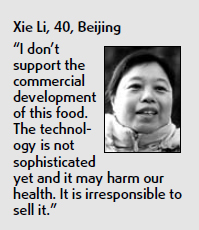Government and Policy
GM rice could hit shelves
By Shan Juan and Jin Zhu (chinadaily.com.cn)
Updated: 2010-02-04 18:56
 |
Large Medium Small |
The government is expected to approve commercial planting of genetically modified (GM) rice in three to five years as a major effort to raise food supply.
Huang Dafang, a member of the Biosafety Committee at the Ministry of Agriculture, said the nation -- which faces shrinking farmland and an increasing population -- will turn to genetically modified organism technology to ensure grain security.
|
 |
|
A farmer smiles after a good harvest of the high-yielding “super rice” in Tiantai, Zhejiang province.[Photo/China Daily] |
In November, the ministry issued biosafety certificates to strains of pest-resistant GM rice and corn.
The announcement has aroused debate on the Internet with several forums soliciting signatures against commercialization of GM rice with the call “Saving our posterity”.
The strains need registration and production trials before commercial output can begin, which may take three to five years, Huang told China Daily.
| ||||
Xue said that he is worried about the health and environmental risks involved in the planting of GM rice although he personally does not oppose to its commercialization.
The government has set a target of increasing grain output by 50 million tons between 2009 and 2020. The current annual average production is 60 million tons.
“Once GM technology is used for mass production, it would definitely help China achieve that target and feed its 1.3 billion people,” said Huang, also a researcher with the Biotechnology Research Institute of the Chinese Academy of Agricultural Sciences.
“The use of GM technology is an inevitable trend for the global agriculture industry, including in China,” he stressed, adding that it has been scientifically proven that the approved GM strains are as safe as non-genetically modified varieties.
Currently, 10 percent of the non-genetically modified rice output is lost annually to pests, and “that means the loss can be avoided with wide use of the technology,” he noted.
The two GM rice strains, developed by Huazhong Agricultural University, would help reduce the use of pesticide by 80 percent while raising yields by as much as 8 percent, said Huang Jikun, chief scientist at the Chinese Academy of Sciences.
The ministry granted safety certificates to other GM crops — cotton in 1998 and tomato and pepper in 1999.
The United States is also a major developer of GM crops and most of the country’s soybean and cotton are from GM strains. But a rice strain which has been given approval for cultivation has not yet seen widespread use.
But given the controversy over the safety of GM food for a long time, such crops are not accepted in most countries worldwide, said Fang Lifeng, spokesman for Greenpeace China’s GM program.
A 2007 survey by the organization found that 65 percent of the 2,000 people polled in the country said they would not choose GM food over safety concerns.
“We firmly oppose the technology being put into mass production and commercialization in a rush,” Fang said.
“To ensure food supply, we have other options with no potential health risks like biological agriculture,” he noted.
“The stamp of approval might have been premature,” said Professor Jiang Gaoming, at Chinese Academy of Sciences’ Institute of Botany.
GM corn sold by Monsanto, the US-based agriculture company, causes organ damage in rats, mostly in the liver and kidney, according to a paper by three French scientists published in the International Journal of Biological Sciences.











